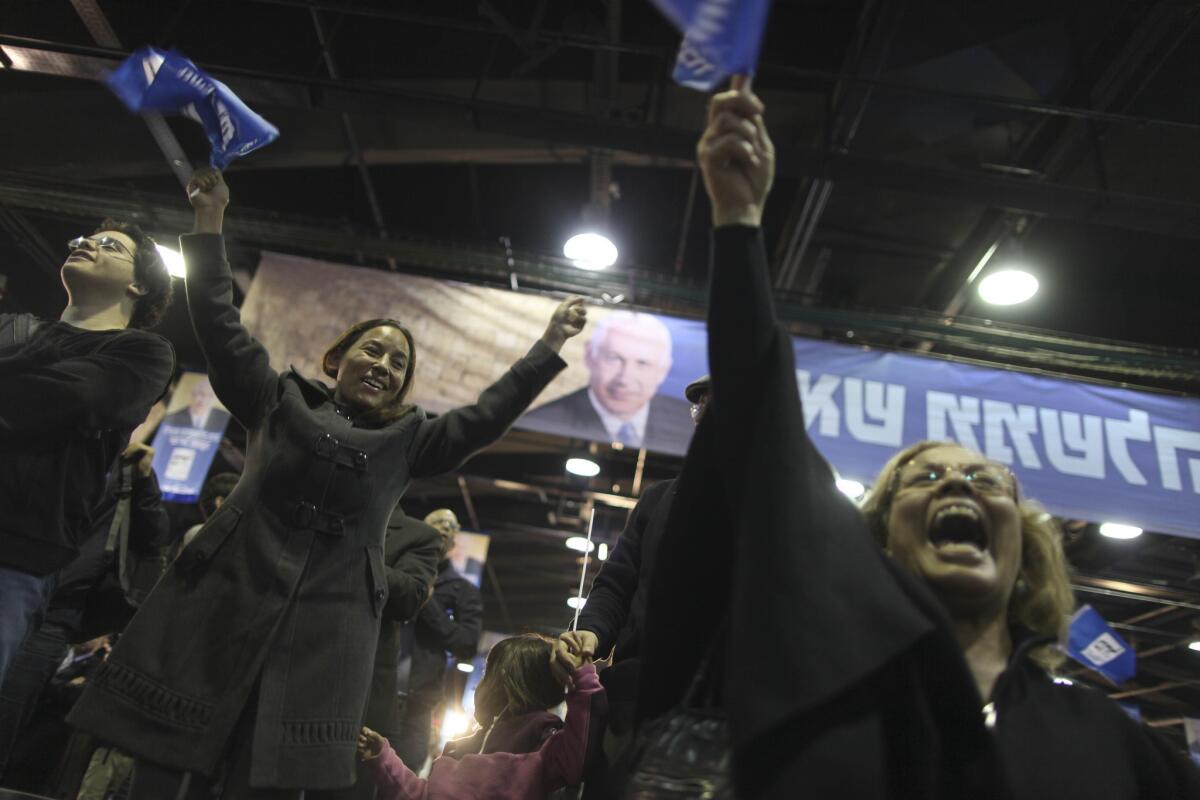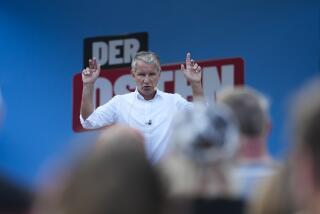Exit polls: Israeli right-wing bloc heading to narrow election win

- Share via
JERUSALEM -- With one of the highest voter turnouts since 1999, Israelis once again threw their support behind the nation’s conservative and religious political parties, probably ensuring the reelection of Prime Minister Benjamin Netanyahu, according to exit polls Tuesday night by Israeli television channels.
Official results are expected early Wednesday.
According to the exit polls, the right-wing bloc squeaked to a narrow victory, winning 62 seats in Israel’s 120-member Knesset. Center-left parties were expected to receive 58 seats. That would be a narrower margin for the conservatives than the 65-55 split between right and center-left after the 2009 election, but probably enough to allow Netanyahu to remain in power.
The right was led by the joint slate of Netanyahu’s Likud party and former Foreign Minister Avigdor Lieberman’s nationalist Yisrael Beiteinu. Together, the two parties are estimated to have won 31 seats -- far less than the total of 42 seats they won four years ago when they ran separately.
Their joint slate failed to excite supporters and many appear to have fled to Jewish Home, a revamped nationalist religious party led by former high-tech entrepreneur and onetime Netanyahu aide Naftali Bennett.
The ultraconservative party appeared to be winning 12 seats, up from three in 2009, the exit polls showed. It campaigned on a promise to fight against Palestinian statehood and called for the annexation of parts of the West Bank.
The impressive showing shot Bennett, 40, an American-born former settler group advisor, to the helm of Israel’s ultraconservative movement, a position likely to allow him to push Netanyahu’s government further to the right.
The ultra-Orthodox party Shas won 12 seats compared with 11 in 2009, according to the polls.
The center-left was led by the surprise performance of newcomer Yesh Atid party, headed by Yair Lapid, 49, a charismatic and ambitious former television broadcaster making his political debut. His party, which was on track to come in second place with 19 seats, appealed to secular moderates, focusing on a promise to ensure that ultra-Orthodox young people serve in the army as other Israelis do.
The left’s stalwart Labor Party was expected to win 17 seats, up from 13 in 2009. Labor Party leader Shelly Yachimovich, 52, a former journalist, is credited with revitalizing the once-sagging party.
Centrist Kadima Party, which won the highest number of seats in 2009, failed to win enough votes to receive any seats, exit polls founds, a stunning defeat for a party that once led the nation under former Prime Ministers Ariel Sharon and Ehud Olmert.
Meanwhile, Kadima’s former chairwoman, Tzipi Livni, 54, who was ousted as its leader in 2012, was expected to win seven seats under her newly formed Movement Party.
Smaller parties on each side of the political divide accounted for the rest of the seats.
ALSO:
11 EU nations to plan tax on financial transactions
Woman is rescued after falling onto subway tracks in Spain
Algeria: Two Canadians among hostage takers, prime minister says
More to Read
Sign up for Essential California
The most important California stories and recommendations in your inbox every morning.
You may occasionally receive promotional content from the Los Angeles Times.










